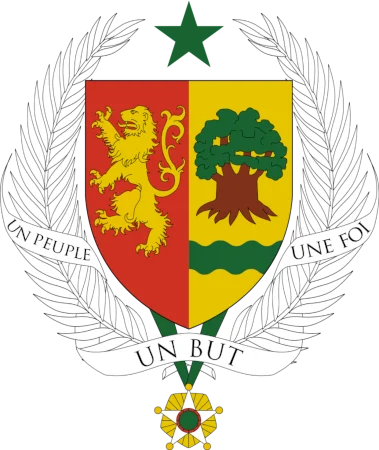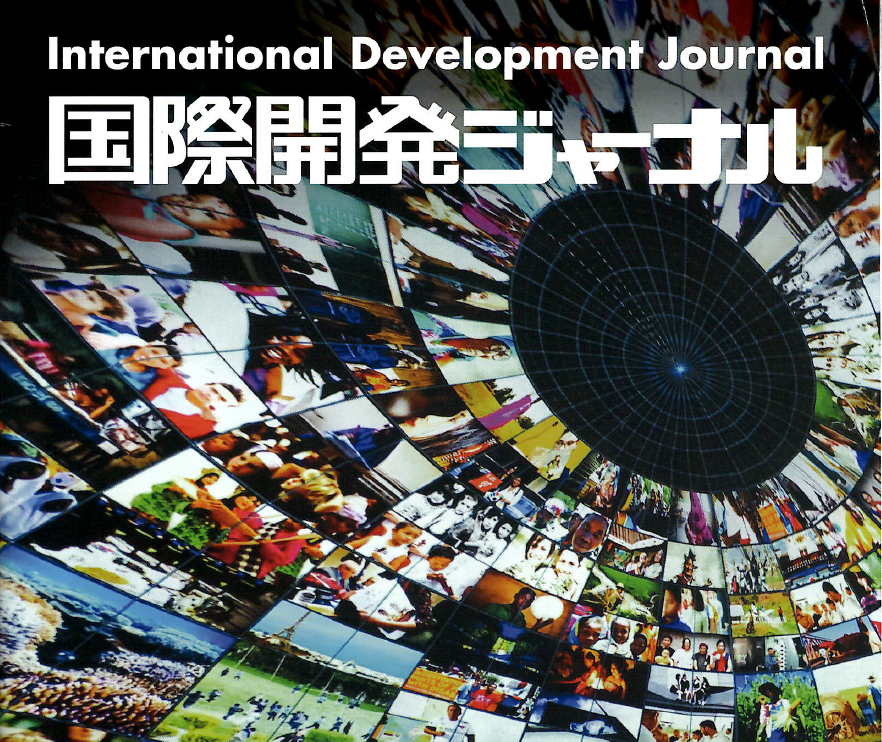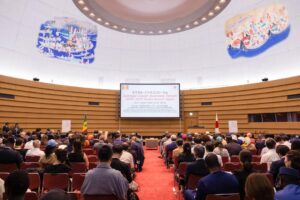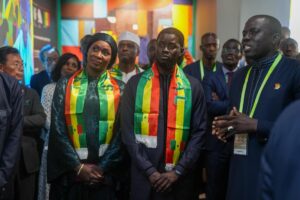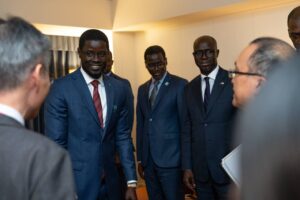En sa qualité de Président du Comité TICAD du Corps diplomatique africain de Tokyo, l’Ambassadeur Jean Antoine DIOUF a accordé un entretien au magazine International Development Journal (Juillet 2025).
Il a livré son analyse sur la trajectoire de la TICAD qui est souvent comparée à d’autres cadres de partenariats stratégiques comme le FOCAC qui dans une perspective africaine, doivent être, selon lui, complémentaires plutôt que concurrentielles.
Se prononçant sur les priorités de la TICAD 9, l’Ambassadeur DIOUF a soutenu que le développement de l’Afrique passera d’abord par une forte volonté politique et la capacité des africains à accélérer la transformation socioéconomique du continent en valorisant ses énormes ressources. Cela emporte la mise en place de programmes de développement à long terme ambitieux et réalistes, mais aussi une prise en charge adéquate des défis liés à la bonne gouvernance, à l’instabilité, et à l’insécurité. Il s’y ajoute la mobilisation des ressources domestiques et le recours à des partenariats gagnant-gagnant avec des partenaires comme le Japon.
—- Lire l’intégralité de l’entretien en anglais —-
1) What are your thoughts on the history of TICAD and its achievements? How do you compare these achievements with other countries’ framework such as FOCAC?
TICAD is a unique partnership in the sense that from a historical perspective it’s the first strategic partnership between Africa and a global power such as Japan. At the inception of TICAD in 1993, we were in the wake of the cold war.
Investing in a continent plagued by civil wars, famine and AIDS was not as fashionable as it is nowadays. Japan believed in Africa’s potential and stepped in with a partnership embedded in ownership, international cooperation and mutual respect.
As we look back more than 30 years later, we must be proud of the achievements ranging from human resource development to flagship projects in strategic sectors such as agriculture, energy, industry, infrastructure, digital transformation, etc.
The impact on the ground is tangible with transformative initiatives more specifically on Health and Education as exemplified by the ABE Initiative and the Japan-Senegal Vocational Training Center which hosts African students from about 15 countries.
Likewise, under late Prime Minister Shinzo ABE leadership TICAD ’s paradigm shift from Official Development Assistance (ODA) to boosting trade and investment between Africa and Japan is also commendable.
Between 2012 and 2023 the number of Japanese companies doing business in Africa has almost doubled reaching nearly 1000, including multinationals and start-ups. You may also recall that at TICAD 8, Japan announced a US$ 30 billion investment of public and private financial contribution over the next three years.
Comparing TICAD with other initiatives won’t be relevant from an African standpoint as we consider that our partnerships are complementary but not in competition. Let us also bear in mind that there is a handful of major economic and political powers from the Arab World, Europe, America and Asia that nurture a strategic partnership with Africa.
Each partner has its own policy, philosophy, ambition and strategy vis-à-vis Africa as a continent and also from a bilateral perspective.
Similarly, each country has its specific history and is adamant to build its trajectory with the partner of their choice. The bottom line is to achieve a win-win partnership based on mutual respect. In my humble view, those partnerships are not exclusive of each other.
2) What initiatives do you think TICAD needs to take for further economic development of your country and African countries?
There is an African saying which goes: “Never count money in someone else’s pocket”.
As African countries, our economic development first lies on our political will and our own capacity to generate transformation by adding value to the enormous resources that our countries are endowed with.
This boils down to having coherent, ambitious and realistic long term development plans, addressing governance challenges, insecurity and political instability, but also mobilizing domestic financial resources to achieve our goals.
Building on the above and in line with the TICAD 9 theme which is “Co-creating innovative solutions with Africa” we can define our development priorities in a forward-looking approach.
It’s worth noting that TICAD’s three pillars which are Promoting Sustainability, Peace and Security and Trade and Investment are consistent with the African Union Agenda 2063.
In this regard, we need bolder engagement in terms of capacity building, human resource development including for women and young people as Africa has the largest number of youngsters in the world.
Investing in connectivity, transport infrastructure and energy is also key in order to support the regional integration agenda.
Moreover, addressing climate change should be top on the agenda as Africa bears a heavy burden as change of precipitation patterns, droughts and floods have dreadful impact on food and water security, while causing climate-related conflicts, migration, etc.
3) What are the priorities for your country and Africa under the current global situation in terms of broader fields such as public health or political stabilities etc.?
In the specific area of health, Africa learned the hard way during COVID 19 how important to be pharmaceutically self-sufficient. While some rich countries were hoarding billions of doses, African countries were grappling to have access to vaccines.
This prompted countries like Senegal to make a strategic investment in a multi-vaccine facility known as the Manufacturing in Africa for Disease Immunization and Building Autonomy (Madiba) project with the support of the IFC, AfDB, Japan and other donors.
This cutting-edge facility which has been inaugurated by President Bassirou Diomaye FAYE in December 2024 will produce up to 300 million doses of essential vaccines per year to cater not only for Senegal but also for the whole of West Africa.
Senegal is known for its political stability and for being a beacon of democracy. The peaceful political transition which occurred in March 2024 is another confirmation of Senegal’s democratic track-record.
Besides, Senegal is now an oil and gas producer which will drive the country’s economic growth and have ripple effects on energy, industry, agriculture et digital sectors.
Against this backdrop, the new government has launched “Senegal Vision 2050” with its transformative projects on energy, infrastructure, industrialization, agriculture, digital transformation, to name a few. If we consider the high potential in terms of return on investment, I call on Japanese businesses to seize such an opportunity through joint-ventures.
At the continental level, accelerating regional integration through Agenda 2063 and its flagship projects such as the AcFTA is a top priority. But there is a prerequisite: silencing guns through the continent and enabling a stable and peaceful business environment.
4) What has been the impact of the USAID shutdown in your country and across Africa?
The real impact is yet to be assessed. But education and health are likely to be impacted like in many developing countries. As a matter of consequence, SDG related targets. To which extent? Only a comprehensive assessment can tell.
This milestone can be an opportunity for us as ODA beneficiary countries to mull on strategies which could foster a homegrown development and self-sufficiency.
Mobilizing domestic financial resources and adding value to our massive natural resources are key to addressing the challenges we face on the Continent.
5) On the other hand, Japan also should learn from African people’s business spirit and new digital economy. Please let me know your ideas.
Well, I would rather dwell on the importance for Japan’s private sector to scrutinize the African business environment where structural transformation is underway in the majority of countries.
Africa remains the world’s second-fastest-growing region after Asia, with a forecast increase in real GDP growth from 3.2% in 2024 to 4.1% in 2025 and 4.4% in 2026.
A structural transformation is being spearheaded by the African continental Free-Trade Agreement which will make of Africa the largest single-market in the world with 1.3 billion people, 54 countries and a €3.18 trillion GDP.
But beyond that and Africa’s massive natural resources, we have a far more precious asset which lies in the African Youth whose optimal potential is yet to be fully unlocked. Thanks to their dynamism, creativity and innovation skills Young Africans are the driving force of the digital transformation in Africa. That’s why fostering dialogue and more collaboration between young Africans and their Japanese counterparts within the TICAD process is of great relevance.
—- Lire l’intégralité de l’entretien en japonais —-
